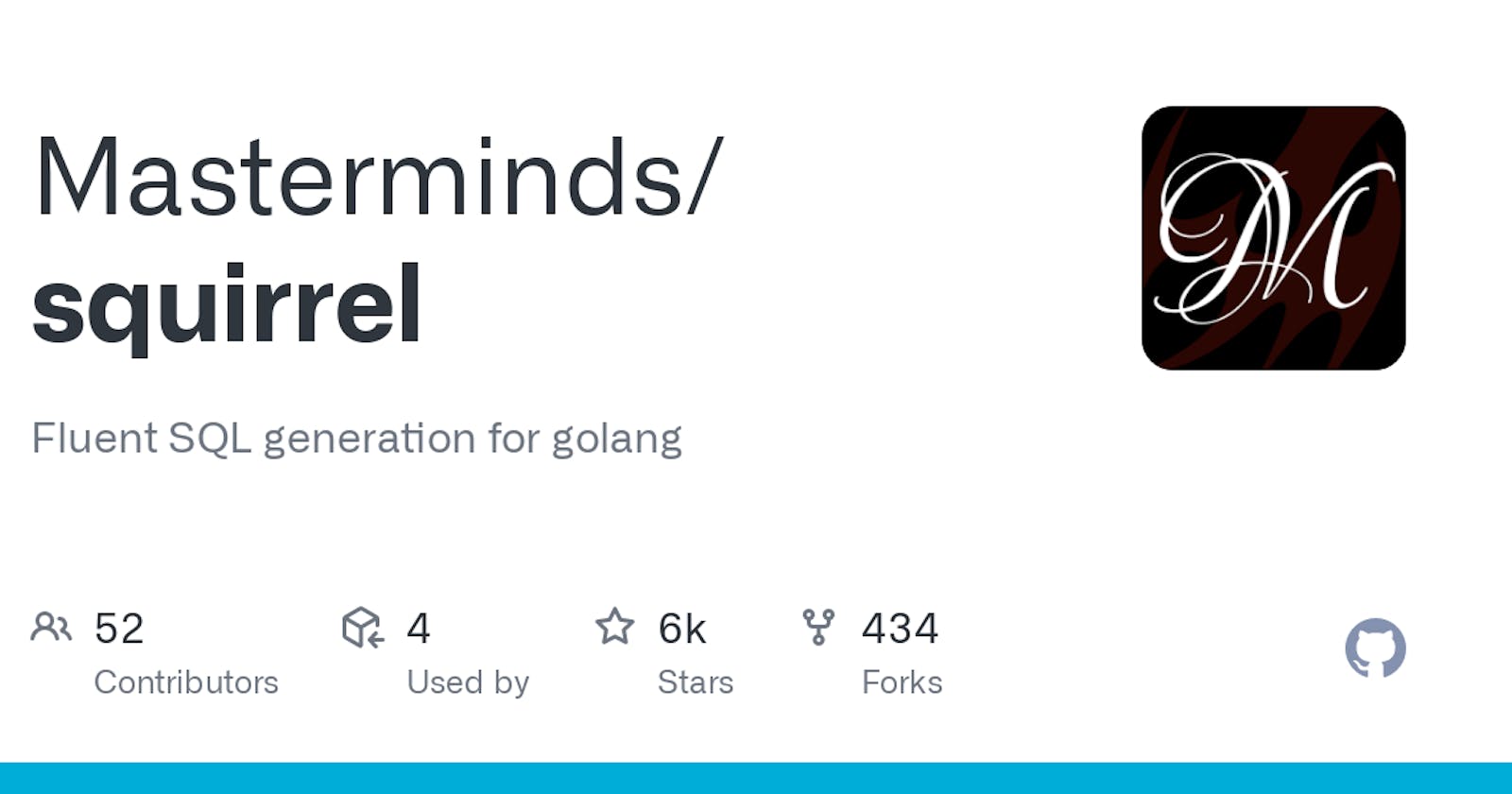1. Introduction
Among the numerous libraries and frameworks available for Go, Squirrel stands out as a powerful query builder and SQL generator that simplifies database interactions and enhances developer productivity. In this article, we delve into the features and benefits of Squirrel in the context of Go development.
Squirrel is a Go library that allows developers to construct SQL queries using a fluent and intuitive API. Its goal is to provide a reliable and type-safe way to generate SQL statements, avoiding common pitfalls and reducing the risk of SQL injection attacks.
With Squirrel, developers can build complex queries programmatically while leveraging the features and idioms of the Go language. Noted that Squirrel is not an ORM (from the official Squirrel github https://github.com/Masterminds/squirrel)
2.Squirrel in Golang example
Let's compare the usage of a raw query and Squirrel for constructing a complex query involving sorting and comparisons in Go.
Example of using the raw query:
package main
import (
"database/sql"
"fmt"
"log"
_ "github.com/go-sql-driver/mysql"
)
func main() {
// Establish a database connection
db, err := sql.Open("mysql", "username:password@tcp(localhost:3306)/database")
if err != nil {
log.Fatal(err)
}
defer db.Close()
// Raw query string
rawQuery := "SELECT id, name, email FROM users WHERE status = 'active' ORDER BY name DESC LIMIT 10"
// Execute the raw query
rows, err := db.Query(rawQuery)
if err != nil {
log.Fatal(err)
}
defer rows.Close()
// Iterate over the result set
for rows.Next() {
var id int
var name, email string
err := rows.Scan(&id, &name, &email)
if err != nil {
log.Fatal(err)
}
fmt.Printf("ID: %d, Name: %s, Email: %s\n", id, name, email)
}
if err = rows.Err(); err != nil {
log.Fatal(err)
}
}
Example of using Squirrel:
package main
import (
"database/sql"
"fmt"
"log"
"github.com/Masterminds/squirrel"
_ "github.com/go-sql-driver/mysql"
)
func main() {
// Establish a database connection
db, err := sql.Open("mysql", "username:password@tcp(localhost:3306)/database")
if err != nil {
log.Fatal(err)
}
defer db.Close()
// Create a query builder instance
qb := squirrel.StatementBuilder.PlaceholderFormat(squirrel.Question)
// Build a SELECT query using Squirrel
query, args, err := qb.Select("id", "name", "email").
From("users").
Where(squirrel.Eq{"status": "active"}).
OrderBy("name DESC").
Limit(10).
ToSql()
if err != nil {
log.Fatal(err)
}
// Execute the Squirrel-generated query
rows, err := db.Query(query, args...)
if err != nil {
log.Fatal(err)
}
defer rows.Close()
// Iterate over the result set
for rows.Next() {
var id int
var name, email string
err := rows.Scan(&id, &name, &email)
if err != nil {
log.Fatal(err)
}
fmt.Printf("ID: %d, Name: %s, Email: %s\n", id, name, email)
}
if err = rows.Err(); err != nil {
log.Fatal(err)
}
}
In the raw query example, we directly define the SQL statement as a string, including the table name, columns, conditions, sorting (ORDER BY), and limit (LIMIT). This approach provides flexibility but can become harder to manage and prone to syntax errors as queries grow more complex.
In the Squirrel example, we use the Squirrel library to construct the SELECT query programmatically. The Squirrel API provides methods like Select(), From(), Where(), OrderBy(), and Limit() to build the query step by step. This approach offers better readability, and maintainability, and reduces the chances of syntax errors since the library handles the generation of the SQL statement.
By using Squirrel, developers can take advantage of the fluent API and build complex queries dynamically, incorporating conditions, sorting, comparisons, and other advanced features more conveniently. Additionally, Squirrel ensures proper escaping and parameterization of values, reducing the risk of SQL injection vulnerabilities.
For more Squirell syntax, use can refer to this official document:
https://github.com/Masterminds/squirrel
3.Conclusion
Squirrel is a versatile and efficient query builder for Go that simplifies the construction of SQL statements while leveraging the power and safety of the Go language.
With its fluent API, database-agnostic nature, type safety, and SQL injection prevention mechanisms, Squirrel enhances developer productivity and helps build robust and secure applications. Whether you are building a small web application or a complex data-intensive system, Squirrel can be a valuable tool in your Go programming toolkit.
